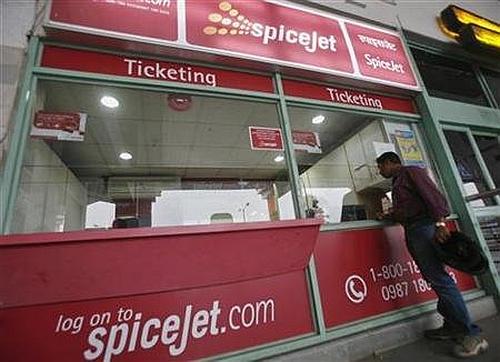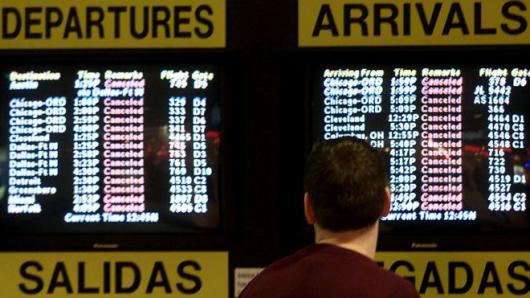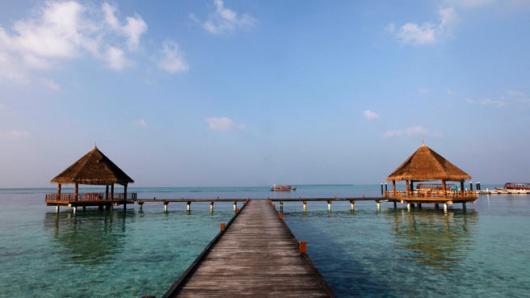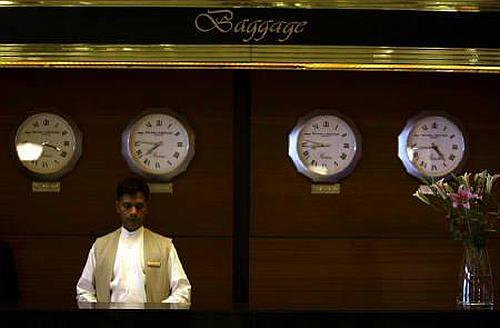Photographs: Jayanta Dey/Reuters Surajeet Das Gupta in New Delhi
Global low-cost carriers, Ryanair and EasyJet, sell over 90 per cent of air tickets directly through their own websites.
Back home, earlier this month, SpiceJet managed to sell on its own portal nearly 70 per cent of the one million discounted tickets it had put up for sale for three days, though buyers complained the site had crashed frequently.
Therein resides an important message for online travel agents. In order to protect the wafer-thin profit margins, low-cost airlines will seek to edge them out of business.
At the moment, these agents sell over 24 per cent of all airline tickets booked in the country. That number will come down. So, they need to look for new revenue streams.
The agents have been hit by a double whammy.
They are competing with their main partners, the airline companies who, confronted with the economic slowdown and intense competition, want to grab a larger slice of the ticketing pie, instead of conceding it to travel agents.
It helps them reduce costs (they don't have to pay commissions) and create customer loyalty, besides generating future revenue streams.
At the same time, the steady fall in passenger growth (it fell 12 per cent last year) and a tough aviation market are forcing airlines to squeeze the agents' margins. This has seriously impacted their bottom-line.
That is why the smarter agents are already changing track to ensure survival.
...
Stung by airlines, travel portals change track
Image: Makemytrip.com founder and CEO Deep Kalra.Photographs: Courtesy, Yourstory.in
Deep Kalra, founder and CEO of Makemytrip.com, the largest player in the online travel business in the country, says: "We had anticipated this trend. Margins are under pressure in air travel, so we are diversifying our business model and moving aggressively into hotels, holidays and packages which provide better profit margins."
He concedes it is a global trend. The most valuable online travel agency, priceline.com (with market capitalisation of $33 billion), gets over 97 per cent of its revenues from selling hotel rooms.
It is much the same for expedia.com (market capitalisation of over $8 billion) with 73 per cent of its revenues coming from hotel bookings.
Also, globally the share of online airline ticketing is increasingly shifting to portals run by the airlines themselves; from 30 per cent a few years ago, airlines now account for 50 per cent of all tickets sold.
But does it make sense for airlines and the online travel agents to battle in the same market? Airlines say their portals give customers cheaper fares and transparent prices, unlike the agents.
"It is cheaper for the customers as they don't have to pay commissions to travel agents. Budget carriers in the US and Europe do this and the regulator, and the consumer forums encourage unbundled fares so the customer knows what he is paying for. The portals are travel agents and they charge commission which airlines don't," says an executive of a domestic airline. He also says it creates loyalty of the company to the brand.
...
Stung by airlines, travel portals change track
Image: Portal wants to grow their non-airlines business.Photographs: Reuters
Changing dynamics
The skies ahead are cloudy for Indian portals as well. Kalra says before his company came out with its initial public offering, 90 per cent of its business was from air travel; that number is now down to 70 per cent. He says the ratio would become 50-50 in next few years.
It's a similar story at the other large travel portal, Yatra.com. The share of its air travel business has fallen from 85 per cent two years ago to 70 per cent now.
Sharat Dhall, president, Yatra.com, says: "In the next 24-36 months, we want the non-airline business to be 50 per cent of our revenues". The change is being impelled by the new business reality.
Profit margins in selling air tickets have fallen from around 7 to 8 per cent to around 5 to 6 per cent. It is expected to fall further with most airlines struggling to stay afloat in a slowing economy.
For travel portals, selling hotel rooms is definitely more profitable than selling flight tickets. Hotels pass on margins of 10 to 15 per cent, which makes it a very attractive proposition.
"The more fragmented the landscape, the better is the margin. There are as many as 20,000 to 30,000 hotels in the country, most of which are smaller independent hotels, which cannot advertise to book rooms. We act as their marketing arm by hosting them on our site; so they are ready to offer us better margins" says Kalra.
...
Stung by airlines, travel portals change track
Image: Travel portals have started focussing on hotel booking.Photographs: Reuters
Makemytrip, for instance, has tied up with over 10,000 hotels across the country and wants to add another 5,000 in few years. It is also tying up with guest houses across the country to offer consumers an alternative to hotels at budget prices.
Yatra's Dhall says that increasingly consumers have become more comfortable in booking hotels online. Two years ago, only 30 per cent of its hotel bookings were done online, the rest was through phone-ins where consumers asked for more details.
But now, he says, the numbers have exactly reversed. Dhall says he plans to double the number of hotels, home stays, and lodgings on offer on his website in the next 24 months.
Makes business sense
Holiday packages are also attracting attention of the online travel agents because of good profit margins. Agents can hope to get around 15 per cent on holiday packages when air travel is not included and about 12 per cent when it is included.
Portals are already opening up to this new possibility. Makemytrip is introducing a service that would let travellers put together their own plan for a trip.
...
Stung by airlines, travel portals change track
Image: IndiGo and Jet have started selling holiday packages on their website.Photographs: Arko Datta/Reuters
Hotels or travel companies who want to list their products would have to pay an advertising fee to the portal - another stream of revenue.
Domestic airline portals are even going a step further - IndiGo and Jet have now started selling holiday packages, taking on the online travel agents in their new line of business.
But the top executive of an agent says he is not worried. "Their offers will always be limited to places where they fly. And they can never get the kind of prices we get with hotels, as we are aggregators and offer large volumes to hotels and get better rates," he says.
Online travel agencies say it does not make business sense for airlines to get into distribution of air tickets in a big way.
Marketing costs of the website, money they pay to payment gateways, amongst others, could cost an airline two to three per cent of their ticket revenue.
"The point is that what they spend on the service is no different from what they pass on as margins to us," says Dhall.
But airlines are clearly not impressed. And online travel agents know that diversification of their business is the key to their survival.







article